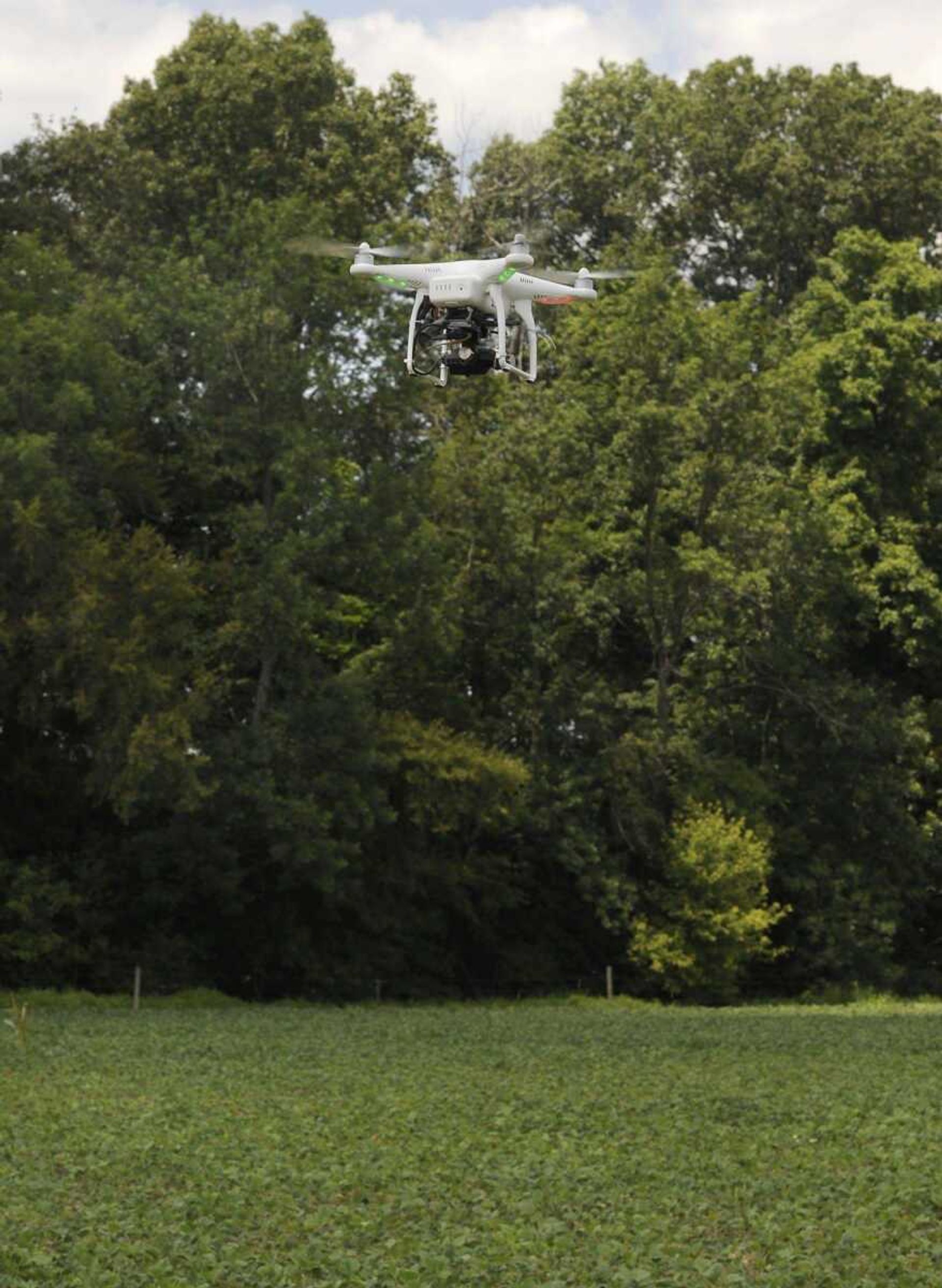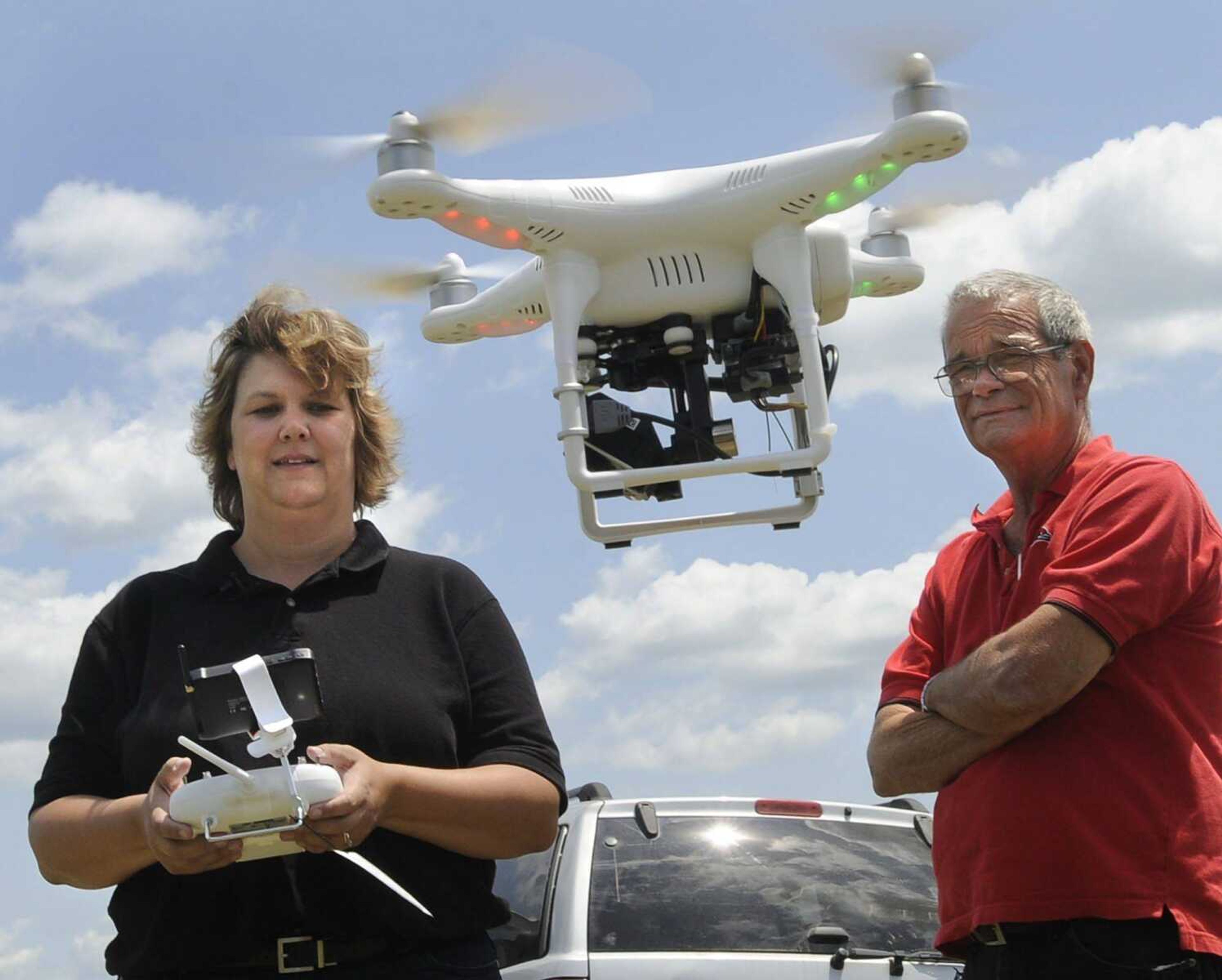Drones find a landing pad in SEMO farm research
The department of Agriculture at Southeast Missouri State University has a new addition to its farm, and it's not something that can be raised, herded or processed. Students and faculty recently have been trained how to use their newest device -- an unmanned aerial vehicle, or drone, which has been unofficially named Ag Force One...
The Department of Agriculture at Southeast Missouri State University has a new addition to its farm, and it's not something that can be raised, herded or processed.
Students and faculty recently have been trained how to use their newest device -- an unmanned aerial vehicle, or drone, which has been unofficially named Ag Force One.
Department chairman Dr. Mike Aide said the $6,000 piece of equipment will allow for many types of educational development.
"We're going to use the drone for education purposes in our classroom to teach agriculture students cutting-edge technologies ... but we'll also use it in our research and to demonstrate different technologies to the agricultural community," Aide said.
Besides the University of Missouri-Columbia, Southeast is the only school in Missouri to have acquired a drone for educational purposes. Students in plant science classes such as water management and cotton and rice production will use the drone.

They will assess crops by entering a flight path, and the device's camera will take different shots. The drone can get within three feet of crops. Students then will evaluate the data to assess changes to a crop management plan, a Southeast news release states.
"The Southeast program is for younger people to take the knowledge they learn at school and bring it home to their communities to implement it. Mizzou is more a research-based program. But both are excellent," Aide said.
The drone will be used in fields of cooperating landowners and at the David M. Barton Agriculture Research Center, as well as at the Missouri Rice Research Farm in Glennonville, Missouri, and at Southeast's regional campuses in Malden, Kennett and Sikeston.
Aide said they also plan to use the drone during field days in the fall to showcase it even more.
"We have a field day coming up with FFA and the general public, but we also have farm days down at the rice research farm. We coordinate with the University of Missouri-Columbia on some of their products and such. It'll get wide visibility around the region," he said.
Aide and Dr. Indi Braden, associate professor of agriculture, and four students were trained on operating the drone last week at the Barton Center. Representatives from MRM-Ag Services of East Prairie, Missouri, assisted in calibrating the device and showing its capabilities.
Aide said the drone will gather accurate data about crops and improve efficiency in fields. And by improving accuracy in data-gathering, a more precise amount of chemicals, fertilizers and nutrients the soil needs will be used. Farm runoff also will be reduced, all of which will help trim farming costs and protect the environment, the news release said.
The agriculture department plans to use the drone for many type of crops, but Aide mentioned corn and wheat specifically.
"In corn, if it's a little yellow, you'll easily be able to detect it, and that would probably be a nitrogen deficiency. Or that's where water stood, [or] you didn't put down enough fertilizer, or whatever it may be," Aide said about the drone's photo capabilities. "If the timing of the crop is correct and you still have some time in the life cycle of the crop, you can put out rescue treatments."
MRM officials said the drone can travel up to 35 mph and can ascend 400 feet. A hand-held controller or an iPad are used to operate the vehicle.
The drone's ability to fly over fields and crops to take measurements and gather data will be easier and more effective than using a satellite, Aide said.
The drone works by carrying a high-powered camera that shoots photos and video footage. Southeast agriculture faculty plan to use the drone for survey purposes with a focus on agriculture research, including spatial analysis and precision techniques.
Although the drone is a valuable tool for education, the Federal Aviation Administration is putting some limits on its uses.
The agency says model aircraft are meant to be used as a hobby or recreational purposes, but it should not be used to make money or affect business decisions.
Aide said drones may be used if users are on their own property or if they have permission from a client. But no drones can go higher than 400 feet.
Southeast is using the drone only for educational purposes, but Aide said he believes it won't be more than five years before all farmers are implementing the unmanned aviation units.
Drones already are being used in a small number of other countries to meet increased food production needs, and Aide said he believes the U.S. is still in the forefront of these developments.
smaue@semissourian.com
388-3644
Connect with the Southeast Missourian Newsroom:
For corrections to this story or other insights for the editor, click here. To submit a letter to the editor, click here. To learn about the Southeast Missourian’s AI Policy, click here.










